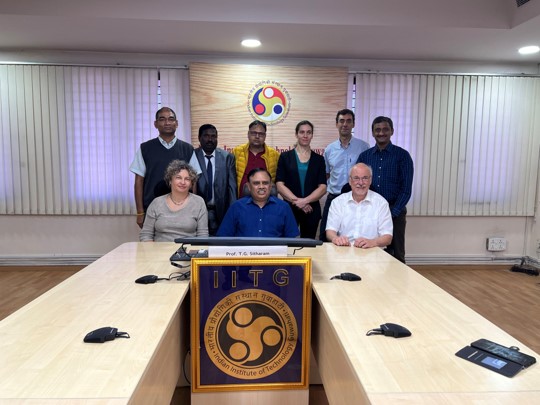IIT Guwahati collaborates with European partners to address issues in the Indian Water Sector
Ø The Institute is partnering with IIT Bombay in the project Ø The collaboration is part of the LOTUS Indo-European project, an initiative by DST and European Commission
Guwahati : Indian Institute of Technology Guwahati and Indian Institute of Technology Bombay are working actively towards addressing the staggering issues in the Indian Water Sector under the Indo-European project ‘Low-cost innovative technology for water quality monitoring and water resources management for urban and rural water systems in India’ (LOTUS).
The LOTUS Indo-European project aims at providing solutions for several issues in the Indian water sector. A core element of the LOTUS project is a novel water quality sensor that builds on previous work of Ecole Polytechnique, Paris, France and has been further developed during the project by researchers at Université Gustave Eiffel in collaboration with IIT Guwahati and the SME EGM, Sophia Antipolis, France.
The core of the LOTUS sensor, is a chip with Carbon Nanotube (CNT) based sensing elements that are capable of measuring multiple quality parameters such as Total Dissolved Solids (TDS), Potential of Hydrogen (pH), Chlorine, and Arsenic.
Other components of the project include:
Ø Software tool that enables water quality monitoring and safe water supply in piped water network and tanker supply system
Ø A portable solar operated disinfectant system integrated with a water quality controller by using LOTUS sensor
Ø A software platform for the optimization of the water supply in irrigation.
Speaking about the advantages of the developed technologies, Prof. S Senthilmurugan, Dept. Chemical Engineering, and, Chairperson, Technology Incubation Centre, IIT Guwahati, said, “LOTUS water quality sensor requirements are established after collecting requirements from Indian water utility owners, operators, end users and R&D experts and therefore LOTUS sensor is expected to satisfy requirements of Indian water industries. Successful commercialization of the LOTUS water quality sensor will provide a low-cost water quality monitoring and safe drinking water supply solution to the Indian citizens which is in line with the vision of the Jal Jeevan Mission of Govt. of India and the make-in-India initiative. Even during COVID times, the LOTUS team from IIT Guwahati was able to continue the groundwater sample collection and sensor development work with minimal delay and this achievement was possible with the consistent support and strategic vision of Prof. T.G. Sitharam, Former Director, IIT Guwahati to LOTUS project.”
For the commercial production of the developed low-cost LOTUS sensor for the Indian market, IIT Guwahati is collaborating with Linxens India Private Limited and the new start-up Hydroscope Technology Private Limited. The process technology licensing between both companies and LOTUS team (IIT Guwahati and Université Gustave Eiffel) is in under progress.
Speaking about the impact of the LOTUS project, Prof. Ravindra Gudi, Dean (Alumni & Corporate Relations) at IIT Bombay said, “As the critical centrepiece, the LOTUS sensor developed at IIT Guwahati is being designed to address sensing needs and quality control aspects across different use case scenarios encompassing safe drinking water, agricultural water & waste water, The overall framework including the LOTUS sensor, and the quality monitoring and control algorithms developed at IIT Bombay, would be developed and deployed on platforms to provide improved solutions to address major water quality control issues across the country.”
The European and Indian Partners of the LOTUS project recently assembled in IIT Guwahati. During this meeting, the partners reviewed the progress of the project and finalised the commercialization plan for LOTUS sensor fabrication in collaboration with Indian industries.
The IIT Guwahati LOTUS project team is planning to demonstrate LOTUS solutions in Guwahati and Bangalore city from July – Dec 2023 in collaboration with LOTUS partners. In first level, the LOTUS sensor will be installed to inform the user of the quality of water supplied to them through pipes, tanks and from groundwater, and for the mitigation of leakages in piped supply. In a second level, the optimum dosage of disinfectants will be demonstrated by using LOTUS solutions.

